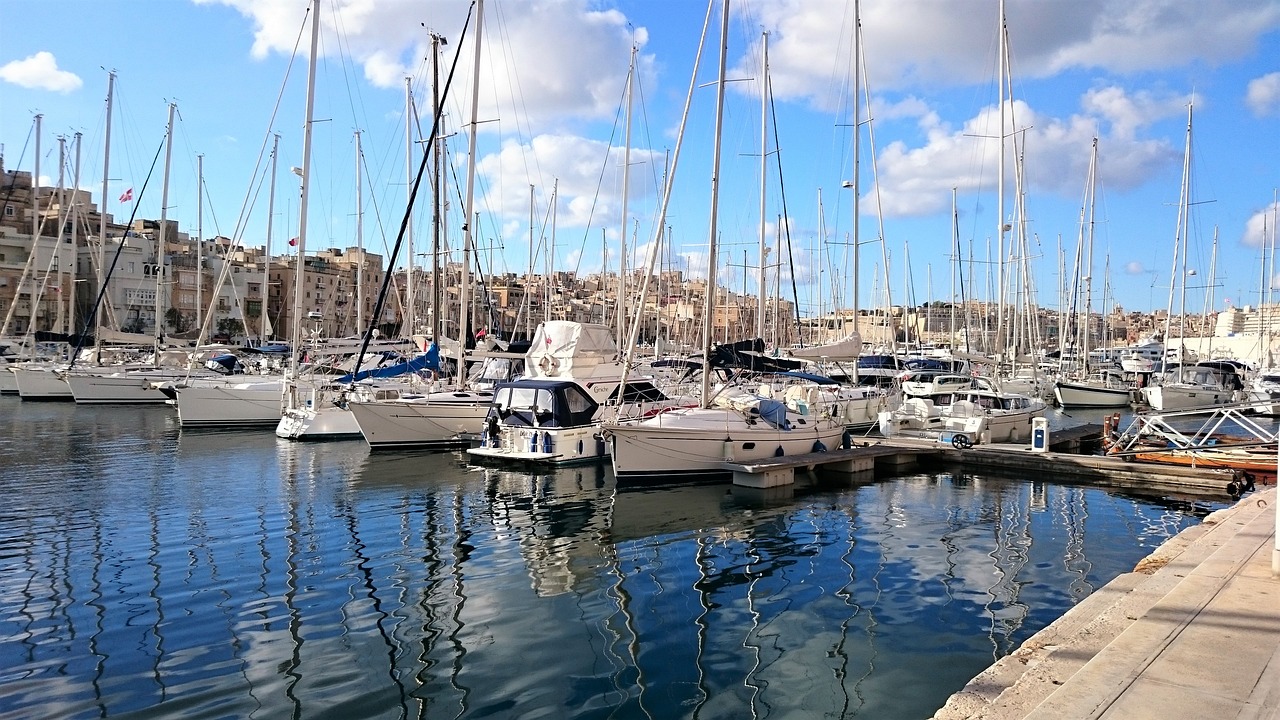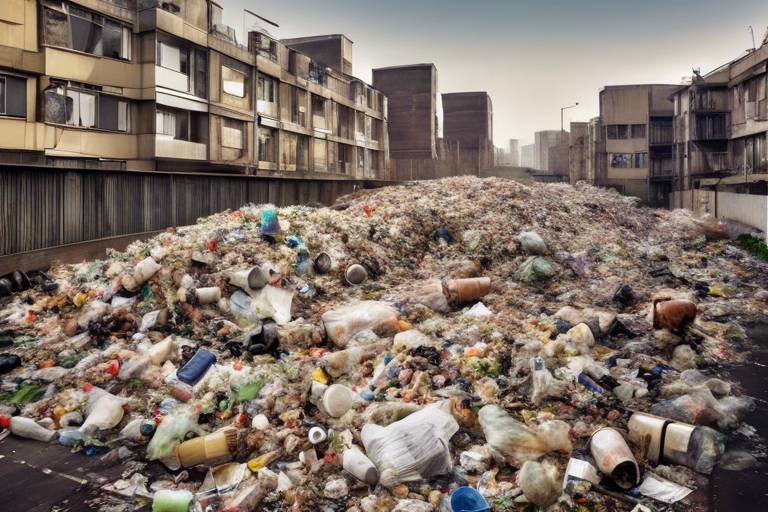Tips to Minimize Waste While Travelling
Traveling is one of life's greatest pleasures, allowing us to explore new cultures, meet fascinating people, and create unforgettable memories. However, as we embark on our adventures, it's crucial to consider the impact we have on the planet. With the growing concern over environmental issues, many travelers are seeking ways to minimize waste and travel sustainably. In this article, we will delve into effective strategies that not only help you reduce your environmental footprint but also enhance your travel experience. So, buckle up and get ready to discover how you can make a positive impact while enjoying your journeys!
Effective waste minimization starts with proper planning. Before you even pack your bags, take some time to research your destination. Look into accommodations that prioritize sustainability, and explore transportation options that reduce waste generation. For instance, consider using trains instead of planes for shorter distances, as they typically have a lower carbon footprint. By planning ahead, you can make informed choices that align with your eco-friendly goals. Remember, a little research can go a long way in ensuring that your travel choices support the environment.
When it comes to lodging, selecting eco-friendly hotels or lodges can significantly reduce your environmental footprint. These establishments often prioritize sustainable practices, such as energy efficiency, water conservation, and waste reduction. Many eco-friendly accommodations also incorporate local materials and support community initiatives. Not only do you get to enjoy a unique travel experience, but you also contribute to the preservation of the environment. So, the next time you're booking a place to stay, consider opting for accommodations that share your commitment to sustainability.
Engaging with local businesses not only enriches your travel experience but also contributes to the local economy. When you choose to dine or shop at establishments that emphasize sustainability, you are making a conscious effort to support the community. Look for restaurants that source their ingredients locally and shops that offer handmade or eco-friendly products. By doing this, you not only enjoy authentic experiences but also help reduce the carbon footprint associated with transporting goods over long distances. It's a win-win situation!
When dining out, opt for restaurants that minimize waste through practices like composting and using biodegradable packaging. This choice supports environmentally friendly dining options while allowing you to enjoy local cuisine. Furthermore, don't hesitate to ask your server about their sustainability practices. Many restaurants are proud of their efforts to reduce waste and will appreciate your interest. Eating responsibly not only satisfies your taste buds but also aligns with your commitment to minimizing waste.
Avoiding single-use plastics is one of the easiest ways to make a significant impact while traveling. Carry reusable items, such as a stainless steel water bottle, utensils, and shopping bags. This simple habit can drastically decrease the amount of plastic waste generated during your travels. Remember, every small action counts! By refusing single-use plastics, you're setting an example for others and contributing to a cleaner planet. It’s like packing a little piece of sustainability into your suitcase!
Utilizing public transportation is a sustainable way to explore your destination while minimizing your carbon footprint. Buses, trains, and trams are often more eco-friendly compared to individual car rentals. Plus, using public transport allows you to experience the local culture in a way that taxis or rental cars simply can't match. Imagine riding a crowded bus filled with locals, sharing stories, and soaking in the atmosphere—it's an adventure in itself!
Packing efficiently can help reduce waste during travel. Opt for reusable containers for snacks or meals, eco-friendly toiletries, and versatile clothing that can be mixed and matched. This approach not only minimizes the need for disposable items but also keeps your luggage lighter. Think of it as packing a toolkit for sustainability—every item you bring should serve a purpose, reducing waste and enhancing your travel experience.
Selecting sustainable travel products, such as biodegradable toiletries and eco-friendly gear, can further reduce your environmental impact. Consider the materials and production methods of the items you bring. For example, look for toiletries that come in recyclable packaging or are made from natural ingredients. By making conscious choices about the products you use, you can ensure that your travel habits align with your values.
Engaging in local clean-up efforts can leave a positive mark on the places you visit. Participating in these activities fosters community spirit while helping to maintain the beauty of your destination. Many organizations host clean-up events, and joining one can be a fulfilling way to give back. Imagine spending a day at the beach, not just soaking up the sun but also helping to keep it pristine for future visitors. It's an enriching experience that connects you with the local community while making a tangible difference.
- How can I reduce waste while traveling? Start by planning ahead, choosing eco-friendly accommodations, and avoiding single-use plastics.
- What are some eco-friendly travel products? Look for biodegradable toiletries, reusable water bottles, and sustainable clothing made from eco-friendly materials.
- Is public transportation a good option for reducing my carbon footprint? Yes! Public transportation is often more eco-friendly than renting a car, and it allows you to immerse yourself in the local culture.
- How can I support local businesses while traveling? Choose to eat at restaurants that source ingredients locally and shop at stores that emphasize sustainability.

Plan Ahead
Effective waste minimization starts with proper planning. Imagine embarking on a journey without a map—chaos, right? Planning your trip is like charting a course through uncharted waters; it helps you navigate the complexities of travel while keeping sustainability at the forefront. Begin by researching your destination thoroughly. Look for accommodations that prioritize eco-friendly practices, and consider transportation options that reduce your environmental impact. For instance, instead of flying to a nearby city, could you take a train or a bus? Not only does this choice cut down on carbon emissions, but it also allows you to soak in the scenic views along the way.
Additionally, dive into the local culture before you arrive. Familiarize yourself with local customs, sustainable restaurants, and shops that support the environment. This legwork pays off, as you’ll find that many local businesses are eager to share their sustainable practices and products with visitors. For example, you might discover a charming café that uses compostable cups or a market that sells organic produce in bulk, reducing the need for excess packaging.
To help you visualize your planning strategy, here’s a simple table outlining key aspects to consider:
| Planning Aspect | Action Item |
|---|---|
| Accommodations | Research eco-friendly hotels or lodges |
| Transportation | Opt for public transport or carpooling |
| Dining | Look for restaurants with sustainable practices |
| Activities | Choose tours that promote environmental awareness |
In essence, planning ahead is your secret weapon in the quest to minimize waste while traveling. It’s not just about making the trip enjoyable; it’s about ensuring that your journey contributes positively to the environment. By taking the time to research and make informed choices, you’ll not only enhance your travel experience but also leave a lighter footprint on the planet.

Choose Eco-Friendly Accommodations
When it comes to planning your travels, one of the most impactful decisions you can make is choosing eco-friendly accommodations. Not only does this choice reduce your environmental footprint, but it also enhances your overall travel experience. Imagine staying in a place that not only offers comfort but also aligns with your values of sustainability. Eco-friendly hotels and lodges often implement various practices that prioritize the planet, such as energy efficiency, water conservation, and waste reduction. This means that every night you spend there contributes positively to the environment.
Before booking, take a moment to research the accommodations available at your destination. Look for certifications such as LEED (Leadership in Energy and Environmental Design) or Green Key, which indicate that a property adheres to sustainable practices. You might be surprised to find that many hotels are stepping up their game by incorporating renewable energy sources, like solar panels, and using eco-friendly materials in their construction and operations. This not only helps in conserving resources but also in providing a healthier environment for guests.
Moreover, eco-friendly accommodations often feature unique designs and amenities that enhance your stay. For example, some lodges might offer organic gardens from which they source their ingredients, allowing you to enjoy fresh, local meals. Others might provide bicycles for guests to explore the area, reducing reliance on cars and further minimizing carbon emissions. Staying at a place that actively contributes to the local community and environment can make your travels feel more enriching and meaningful.
Additionally, engaging with the staff at these eco-conscious hotels can provide insights into local sustainability efforts. Many of them are passionate about their initiatives and eager to share tips on how to explore the area responsibly. This interaction not only enriches your experience but also fosters a sense of community and connection with the place you are visiting. So, next time you’re booking a trip, consider the broader impact of your accommodation choice. It’s not just a place to rest your head; it’s an opportunity to make a positive change in the world.

Support Local Businesses
When you travel, supporting local businesses can greatly enhance your experience while also contributing to the sustainability of the community you’re visiting. Imagine walking into a quaint little café, where the aroma of freshly brewed coffee fills the air, and the barista greets you with a warm smile. This is the kind of personal touch you won’t find in a chain restaurant. By choosing to dine at local eateries, shop at neighborhood stores, and participate in community activities, you not only get a taste of authentic culture but also help boost the local economy.
Local businesses often prioritize sustainable practices, which can include using local ingredients, reducing waste, and supporting fair trade. For example, many restaurants source their produce from nearby farms, ensuring that you’re eating fresh and seasonal food while also minimizing the carbon footprint associated with transporting goods over long distances. This connection to the land and community can transform a simple meal into a memorable experience.
Moreover, when you buy from local artisans or markets, you’re investing in the community’s future. Each purchase helps keep small businesses afloat, allowing them to thrive and continue offering unique products that reflect the culture of the area. Think about it: wouldn’t you rather take home a hand-crafted souvenir that tells a story rather than a mass-produced trinket? By supporting local businesses, you’re not just shopping; you’re participating in a vibrant community and preserving its identity.
In addition to benefiting the economy, supporting local businesses often leads to discovering hidden gems that guidebooks might overlook. From charming boutiques to family-owned restaurants, these places have character and stories that can enrich your travel experience. So next time you’re planning your trip, consider how you can make a positive impact by choosing to support the local economy. Not only will you enjoy a more authentic experience, but you’ll also be contributing to the sustainability of the places you love to visit.
In summary, supporting local businesses is a win-win situation. You get to enjoy unique experiences, delicious food, and genuine interactions, all while helping to protect the environment and promote sustainability. So, the next time you travel, remember to take the road less traveled, and seek out those local spots that make your destination special.

Eat Responsibly
When it comes to dining while traveling, making responsible choices can significantly impact the environment. It’s not just about satisfying your taste buds; it’s about choosing places that prioritize sustainability and minimize waste. Imagine indulging in a delicious meal while knowing that your choices contribute to a healthier planet. Sounds great, right?
One of the best ways to eat responsibly is to seek out restaurants that use biodegradable packaging and practice composting. These establishments often go the extra mile to ensure that their operations are eco-friendly. By choosing to dine at such places, you not only enjoy local cuisine but also support businesses that care about their environmental footprint. Plus, many of these restaurants source their ingredients locally, which means fresher meals and a reduced carbon footprint associated with transportation.
Another aspect to consider is the menu itself. Opt for meals that are in season and locally sourced. This not only supports local farmers but also reduces the need for long-distance food transport, which can be a major contributor to greenhouse gas emissions. You might find that seasonal dishes are not only more flavorful but also more affordable. It’s a win-win!
Let’s not forget about the impact of food waste. Many travelers don’t realize that the food industry is a significant contributor to global waste. When dining out, consider sharing meals or ordering smaller portions to minimize leftovers. If you do have leftovers, ask for a takeout container (preferably reusable) so you can enjoy that delicious meal later. In fact, many restaurants are now embracing the idea of food waste reduction and will happily accommodate your request.
In addition to these practices, it’s essential to educate yourself about the culinary traditions of the area you’re visiting. This can lead to a deeper appreciation for local cultures and their relationship with food. Try to engage with the chefs or staff about their sustainability practices. You might be surprised by how much they care about the environment and how they incorporate these values into their cooking.
To summarize, eating responsibly while traveling is about making conscious choices that benefit both you and the planet. By selecting restaurants that prioritize sustainability, opting for local and seasonal ingredients, and minimizing food waste, you can enjoy your culinary adventures without the guilt. Remember, every bite counts!
- What are some tips for finding eco-friendly restaurants?
Look for local guides, apps, or websites that list sustainable dining options in your area. You can also check for certifications that indicate eco-friendly practices. - How can I minimize food waste while traveling?
Consider sharing meals, ordering smaller portions, or asking for takeout containers for leftovers. Always be mindful of what you order and try to finish your plate. - Are there specific cuisines that are more sustainable?
Plant-based cuisines often have a lower environmental impact. Additionally, cuisines that emphasize local ingredients tend to be more sustainable.

Reduce Single-Use Plastics
When it comes to traveling, one of the easiest ways to make a significant impact on the environment is by reducing single-use plastics. These pesky items, like plastic bags, straws, and water bottles, may seem convenient, but they contribute massively to the global waste crisis. Imagine walking through a beautiful beach only to find it littered with plastic debris. It’s not just an eyesore; it’s a threat to marine life and ecosystems. So, how can you travel smart and keep our planet clean?
First off, start by carrying reusable items. A sturdy, reusable water bottle can save you from buying countless plastic bottles during your trip. Not only does this cut down on waste, but it also keeps you hydrated without the guilt. Many places now have refill stations, and some even offer discounts for bringing your own bottle! Similarly, consider packing reusable utensils and a cloth shopping bag. These small changes can make a big difference.
Another effective strategy is to choose accommodations and restaurants that prioritize sustainability. Many hotels and eateries are now aware of the environmental impact of single-use plastics and are taking steps to minimize their use. Look for places that offer alternatives, like biodegradable packaging or composting options. By supporting these businesses, you're not just enjoying your trip; you're also sending a message that sustainability matters.
Moreover, when dining out, you can further reduce plastic waste by opting for meals that come in bulk or are served with minimal packaging. For instance, instead of ordering takeout that often comes in plastic containers, why not dine in and enjoy the atmosphere? This not only enhances your experience but also reduces the amount of waste generated. Plus, it’s a great way to connect with locals and immerse yourself in the culture.
In addition, consider participating in local initiatives aimed at reducing plastic waste. Many cities offer programs or events focused on cleaning up plastic pollution. Not only will you be making a positive impact on the environment, but you'll also meet like-minded travelers and locals who share your passion for sustainability. It’s a win-win!
Ultimately, reducing single-use plastics while traveling is all about making conscious choices. By being mindful of our consumption habits and opting for reusable alternatives, we can enjoy our journeys while protecting the planet. So, the next time you pack your bags, think about what you can bring along to minimize waste. After all, every little effort counts!
- What are some alternatives to single-use plastics while traveling? Consider using reusable water bottles, cloth bags, and metal straws. These items can help you avoid single-use plastics effectively.
- How can I find eco-friendly accommodations? Use travel websites that filter results for sustainable hotels or look for certifications like Green Key or EarthCheck.
- Are there any specific countries that are better at minimizing plastic waste? Countries like Sweden, Germany, and Costa Rica have implemented effective policies to reduce plastic waste and promote recycling.

Use Public Transportation
Utilizing public transportation is not just a practical choice; it’s a game-changer for reducing your carbon footprint while traveling. Imagine hopping onto a vibrant city bus, surrounded by locals, and feeling the pulse of the place you’re visiting. It’s like diving into the heart of the culture, all while being kinder to the planet. Public transportation systems, such as buses, trains, and trams, are often more eco-friendly than individual car rentals. They help consolidate the number of vehicles on the road, which can lead to a significant decrease in greenhouse gas emissions.
Moreover, using public transport can save you money that you can then spend on local experiences or delicious meals. Think about it: why pay for gas, parking, and potential tolls when you can pay a fraction of that for a bus or train ticket? Plus, many cities offer daily or weekly passes that provide unlimited travel at a reasonable price, making it even easier to explore without breaking the bank.
Here are a few additional benefits of using public transportation:
- Reduced Traffic Congestion: More people using buses and trains means fewer cars on the road, leading to less traffic and quicker travel times.
- Less Stress: Forget about navigating unfamiliar roads or worrying about parking. Public transport allows you to sit back, relax, and enjoy the scenery.
- Social Interaction: Riding public transport offers a unique opportunity to meet and interact with locals, enhancing your travel experience.
Before you embark on your journey, it’s wise to research the public transportation options available at your destination. Many cities have apps that provide real-time updates on schedules and routes, making it easier than ever to navigate. Additionally, consider downloading maps or guides specific to public transport systems, which can save you time and energy.
In conclusion, embracing public transportation is a simple yet effective way to travel sustainably. It allows you to connect with the local culture, save money, and contribute to a healthier planet. So, the next time you’re planning a trip, consider leaving the car behind and hopping on a bus or train instead. Your wallet and the environment will thank you!
Q: Is public transportation safe for travelers?
A: Yes, public transportation is generally safe in most cities. Always stay aware of your surroundings and keep your belongings secure.
Q: How do I find public transportation options in a new city?
A: You can use travel apps, local tourism websites, or ask your hotel for information on public transport options available in the area.
Q: Are public transportation systems in foreign countries easy to navigate?
A: While some systems may have language barriers, many offer maps and signage in multiple languages. It's helpful to familiarize yourself with the system before you travel.

Pack Smart
Packing smart is one of the most effective strategies to minimize waste while traveling. Think about it: every item you bring can either contribute to waste or help reduce it. The key is to choose items that are not only practical but also sustainable. Start by selecting reusable containers for your snacks and meals. Instead of grabbing a plastic sandwich bag, invest in a sturdy, eco-friendly container that you can wash and reuse. This small switch can drastically cut down on the amount of plastic waste you generate during your trip.
When it comes to toiletries, opt for eco-friendly products. Many brands now offer biodegradable soaps, shampoos, and lotions that come in minimal or compostable packaging. You can even find solid alternatives to your liquid toiletries, such as shampoo bars and conditioner bars, which not only save space but also reduce the risk of spills in your luggage. To help you visualize the benefits of sustainable packing, here’s a quick comparison:
| Traditional Products | Sustainable Alternatives |
|---|---|
| Plastic shampoo bottles | Shampoo bars |
| Disposable razors | Safety razors |
| Plastic utensils | Reusable cutlery |
Another essential aspect of packing smart is choosing versatile clothing. Think about items that can be mixed and matched, allowing you to create multiple outfits without overpacking. For instance, a simple dress can be dressed up with accessories for a night out or paired with a jacket for a casual day look. This not only saves space in your suitcase but also reduces the need to buy new clothes while traveling, which can often lead to waste.
Lastly, don’t forget to bring along a few reusable bags. These can be used for shopping, laundry, or even as a day bag for excursions. By having these on hand, you can avoid the temptation of single-use plastic bags, which are often readily available in stores. Remember, every little bit counts when it comes to reducing waste, and packing smart is a crucial step in that journey.
- What are some eco-friendly packing tips? Start by using reusable containers, biodegradable toiletries, and versatile clothing that can be mixed and matched.
- How can I reduce plastic waste while traveling? Carry reusable items like water bottles, utensils, and shopping bags to avoid single-use plastics.
- Are there sustainable alternatives to traditional travel products? Yes, look for biodegradable toiletries, solid shampoo bars, and reusable cutlery to minimize waste.

Choose Sustainable Products
When it comes to traveling sustainably, the products you choose can make a world of difference. It’s not just about what you pack, but how those items impact the environment. By opting for sustainable products, you not only reduce your carbon footprint but also support eco-friendly practices. Imagine this: every time you choose a biodegradable shampoo bar over a plastic bottle, you’re not just helping yourself; you’re contributing to a cleaner planet. It’s like casting a vote for Mother Earth with every purchase!
So, what exactly qualifies as a sustainable product? Generally, these items are made from renewable resources, are biodegradable, or are designed to be reused multiple times. For instance, consider bringing along reusable silicone bags instead of single-use plastic bags. Not only do they cut down on waste, but they also keep your snacks fresh! Additionally, look for eco-friendly toiletries that come in minimal or compostable packaging. Brands that focus on sustainability often have a story to tell, and when you choose their products, you’re part of that narrative.
Here’s a quick comparison of common travel products and their sustainable alternatives:
| Traditional Product | Sustainable Alternative |
|---|---|
| Plastic Water Bottles | Reusable Stainless Steel Bottles |
| Disposable Razors | Safety Razors |
| Single-Use Toiletries | Biodegradable Toiletries |
| Plastic Bags | Reusable Cloth Bags |
When shopping for these products, take a moment to read the labels. Look for certifications like Fair Trade, Organic, or Leaping Bunny (cruelty-free). These labels can guide you in making informed choices that align with your values. Remember, every little bit helps! By choosing sustainable products, you’re not just packing for your trip; you’re packing a punch against environmental degradation.
Lastly, consider sharing your sustainable travel products with fellow travelers. Whether it's through social media or casual conversations at your hostel, spreading the word about eco-friendly alternatives can inspire others to make conscious choices too. It’s all about creating a ripple effect, where each small action contributes to a larger movement towards sustainability.
- What are some examples of sustainable travel products? Sustainable travel products include reusable water bottles, biodegradable toiletries, safety razors, and eco-friendly clothing.
- How can I ensure the products I choose are truly sustainable? Look for certifications like Fair Trade, Organic, and Cruelty-Free on the labels, and research brands that prioritize sustainability.
- Can I make my own sustainable travel products? Absolutely! Many travelers make their own toiletries, such as shampoo bars and deodorants, using natural ingredients.
- Why is it important to choose sustainable products while traveling? Choosing sustainable products helps reduce waste, minimizes your carbon footprint, and supports local economies and eco-friendly practices.

Participate in Waste Clean-Up
When you travel, have you ever stopped to think about the impact you leave behind? One of the most rewarding ways to give back to the places you visit is by participating in waste clean-up initiatives. These activities not only help keep the environment pristine but also allow you to connect with fellow travelers and locals who share your passion for sustainability. Imagine strolling along a beautiful beach or hiking through a breathtaking forest, only to find litter tarnishing the scenery. By joining a clean-up effort, you can transform that experience from frustration to fulfillment.
Many destinations offer organized clean-up events, often spearheaded by local environmental groups or community organizations. These events can range from beach clean-ups to park restoration projects, providing a variety of opportunities to get involved. Not only do you get to do your part for the planet, but you also gain insight into the local ecosystem and the challenges it faces. Plus, it’s a fantastic way to meet new people and make lasting memories. You might even discover a newfound appreciation for the area you’re visiting!
To find clean-up events, consider checking local community boards, social media groups, or websites dedicated to environmental conservation. Many organizations also welcome spontaneous volunteers, so don’t hesitate to bring a few friends along and make a day of it. Just remember to wear comfortable clothing, bring gloves, and stay hydrated!
Participating in a clean-up can also be a great way to inspire others. When you share your experiences on social media or with friends, you encourage a ripple effect of awareness and action. You might find that your enthusiasm sparks interest in others, leading them to join you in future clean-up efforts or adopt more sustainable practices in their own lives. After all, every little bit counts!
In conclusion, engaging in waste clean-up activities while traveling not only enhances your trip but also contributes significantly to the preservation of our planet. So next time you find yourself in a beautiful destination, consider taking a few hours out of your schedule to help keep it clean. You'll leave with a sense of accomplishment and perhaps even a few new friends who share your commitment to making a positive impact.
- How can I find local clean-up events while traveling? Check local community boards, social media groups, and environmental organization websites for upcoming events.
- What should I bring to a clean-up event? Wear comfortable clothing, bring gloves, and carry a reusable water bottle to stay hydrated.
- Can I organize my own clean-up event? Absolutely! Gather some friends, choose a location, and reach out to local organizations for support and supplies.
- Is participating in clean-ups suitable for all ages? Yes! Many clean-up events welcome participants of all ages, making it a great family activity.
Frequently Asked Questions
- What are some effective ways to minimize waste while traveling?
Minimizing waste while traveling can be achieved through several strategies. Start by planning ahead and researching eco-friendly accommodations. Choose sustainable transportation options, such as public transit, and support local businesses that prioritize sustainability. Additionally, carry reusable items like water bottles and shopping bags to avoid single-use plastics.
- How can I choose eco-friendly accommodations?
Look for hotels or lodges that have certifications for sustainable practices, like LEED or Green Key. These establishments often implement energy-efficient systems, waste reduction programs, and environmentally friendly amenities. Reading reviews and checking their websites for sustainability initiatives can also help you make an informed choice.
- Why is it important to support local businesses while traveling?
Supporting local businesses enriches your travel experience and helps sustain the local economy. These businesses often offer unique products and services that reflect the culture of the area. By choosing restaurants and shops that emphasize sustainability, you contribute to a more responsible tourism model that benefits both the community and the environment.
- What should I consider when packing for a trip?
Packing smart is crucial for minimizing waste. Opt for reusable containers for food and drinks, eco-friendly toiletries, and versatile clothing that can be mixed and matched. This approach not only reduces the need for disposable items but also lightens your luggage and makes your travels more enjoyable.
- How can I participate in waste clean-up efforts while traveling?
Many destinations offer organized clean-up events, often through local environmental groups or community organizations. You can join these efforts by checking social media pages, local bulletin boards, or tourism websites. Participating in clean-up activities not only helps keep the area beautiful but also connects you with like-minded travelers and locals.



















